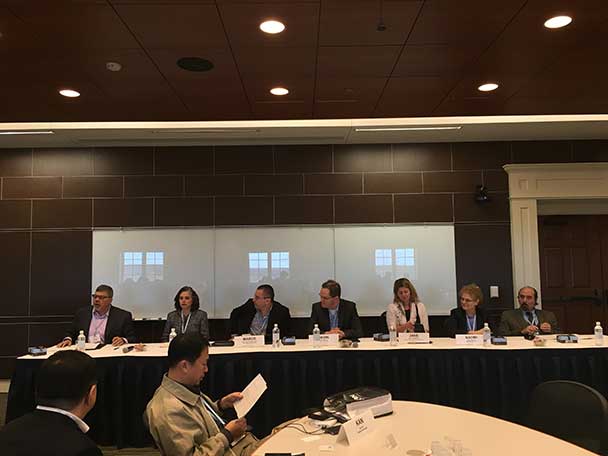
CKGSB’s executive-education partnerships with US graduate business schools illustrate the overall value of international collaboration as a strategy to increase global reach, CKGSB Americas Chief Representative Greg Marchi said during a UNICON panel discussion.
Mr. Marchi, whose responsibility is building CKGSB executive-education alliances with other schools, told a session on international partnerships at the University of North Carolina-Chapel Hill that CKGSB’s executive-education offerings in tandem with schools such as Cornell University’s Johnson Graduate School of Management, University of Michigan’s Ross School of Business and University of Virginia’s Darden School of Business are examples of the kind of collaboration that schools aspiring to expand globally need to think about.
“The way we bring the value for the partner is we say we’ll bring the Chinese component, you bring the American component,” Mr. Marchi told the session, “International Partnership Power: Practical Insight on Creating and Maintaining Successful International Partnerships among B-Schools in Executive Education.”
“And the combination of the two is going to offer a program of learning experience to these individuals that they are not going to get at one school or the other.”
The December 3 event, which ran concurrently with the 2015 UNICON (International University Consortium for Executive Team Development) Conference at UNC-Chapel Hill, aimed to serve as a resource for UNICON members seeking ways to build or expand links with business schools in other countries by allowing the audience to tap the panelists’ extensive experience at partnering with schools globally.
The panel discussion, moderated by Mr. Marchi, touched on how differing academic brands can complement one another in international executive education, notwithstanding the cultural differences that can complicate collaboration.
International partnerships, Mr. Marchi said, are challenging. “It’s the exception when it’s easy. It’s the standard when it’s hard.
“If you’re entering into a new country, you have to be much more considerate of the culture in that country – and to listen and to be open to your partner,” he said. “It’s not about forcing the way you do things into a new country. That foreign country has to understand that things operate differently.”
He urged those considering teaming up with foreign schools to increase their awareness of cross-country cultural differences through taking a course at the potential partner school, or talking to a faculty member with expertise in inter-cultural competencies. CKGSB’s opening of a “gateway office” to support international partnerships has helped it overcome cultural barriers in global academic collaboration, Mr. Marchi said.
The session came as international collaboration grows more important in 21st century higher education. As the UNICON session was told, while a less-than-optimal partnership creates challenges for everyone, a successful partnership results in benefits for all involved.
One of the panelists, Devin Bigoness, Executive Director of Cornell’s Johnson Graduate School of Management, said CKGSB’s partnership with Cornell’s graduate business school in iLEAD is a model for schools seeking global growth through international academic collaboration.
Formed in February through CKGSB’s partnership with the Smith Family Business Initiative at Johnson, iLEAD (Intergenerational Leadership Entrepreneurial Accelerated Development) prepares 20 to 30 next-generation leaders of primarily US and Chinese family businesses for a complex global business environment. The program begins with 11 days in the U.S. in June and moves to China for another 11 days in July. In both countries, participants meet with and work alongside senior executives from leading global companies such as Alibaba, Fosun, Lenovo, NYSE, Google, Tiffany & Co. and Brooks Brothers.
“We’re all trying to be global,” Mr. Bigoness said. “These are the kind of partnerships that help get there fast.”
Daniel Van Der Vliet, founding director of the Smith Family Business Initiative, said that often faced with the burden of legacy, family enterprises need to be vigilant about constant innovation. ILEAD, he said, helps leaders of legacy businesses understand that enduring, cross-cultural collaboration is necessary for success in a shifting global economy.
Collaborations such as iLEAD are a way to “see if there is validity to do degree programs at larger centers or others,” Mr. Bigoness said. “Those are some of the things we think about, and I suggest you think about.”
Under CKGSB’s immersion project with Michigan’s Ross School of Business, a first-year full-time or part-time evening Michigan MBA student can journey to CKGSB in Beijing and study China’s influence on the global economy. With company visits, case studies, cultural excursions and group projects, the course provides the student with a deeper understanding of the business and cultural factors surrounding China’s economic growth while expanding knowledge of Chinese finance, marketing and entrepreneurship practices.
CKGSB’s partnership with Virginia’s Darden School of Business has seen groups of high-level Chinese executives combine a visit to Monticello, the home of Thomas Jefferson, principal author of the US Declaration of Independence, with studies of organizational successes and failures related to growth and innovation.
Another panelist, Rénu Kulkarni, Associate Dean of Executive Education at the University of Chicago’s Booth School of Business, said that while partnerships are difficult, they are an “extremely valuable tool to learn about the market, to learn about your own strengths and how you can test-drive partnering with other people.
“These partnerships teach as much to ourselves as we learn from those we partner with,” she said.
The other panelists were: Gabriel Aramouni, Dean at the School of Administration and Business at Universidad de San Andrés (Buenos Aires, Argentina); Jane Crombleholme, Head of Executive Education, Alliance Manchester Business School, the University of Manchester (Manchester, England); Marco Antonio Serrato Garcia, Executive Director, Tecnologico de Monterrey (Monterrey, Mexico); and Naomi Diamant, Assistant Clinical Professor of Management Communication, Assistant Dean, TRIUM, NYU Stern Global Degree and Executive Education Programs (New York, NY).